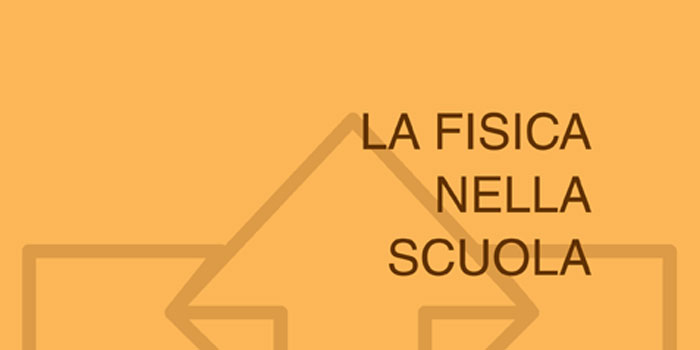Articoli rivista
 Anno XXIX - n.2 - aprile/giugno 1996
Anno XXIX - n.2 - aprile/giugno 1996 Scuola di media
The concept of mean is one of those proposed to students mainly relying on intuition. This paper, which is addressed to teachers, has strictly didactic aimsand, although making progressive generalisations, gives examples from the basics of physics. […]
 Anno LVI - n.2 - aprile/giugno 2023
Anno LVI - n.2 - aprile/giugno 2023 Semplice deduzione delle traiettorie del campo kepleriano e dell’oscillatore armonico isotropo
The recent proof of the First Kepler Law by A. Simha avoids the direct use of calculus. In this paper the procedure is made a little more precise, generalized to all central fields and applied to all Keplerian orbits and to the isotropic harmonic oscillator. […]
 Anno XXIX - n.3 - luglio/settembre 1996
Anno XXIX - n.3 - luglio/settembre 1996 Semplici esperimenti di Fisica nella Scuola Media dell’obbligo
This article presents three experiments on sound propagation and structure of matter, requiring simple materials, suited to middle school pupils. […]
 Anno XXIII - n.2 (speciale: L'elaboratore nella didattica della fisica) - aprile/giugno 1990
Anno XXIII - n.2 (speciale: L'elaboratore nella didattica della fisica) - aprile/giugno 1990 Semplici metodi per interfacciare e usare l’elaboratore come strumento di laboratorio (traduzione di S. Sgrignoli)
I will give some suggestions for presenting informatics to students from a physical point of view instead of a purely algorithmical point of view, with an eye to some interesting aspects of the way the hardware works. I will then examine the possibility of interfacing a microcomputer in simple ways, […]
 Anno XLVIII - n.1 - gennaio/marzo 2015
Anno XLVIII - n.1 - gennaio/marzo 2015 Sfaccettature dello spazio-tempo nella relatività generale: il calcolo di Regge
One of the most innovative and fruitful contribution to theoretical physics by Tullio Regge (1931-2014) is presented. Known as “Regge Calculus”, it consists of a formulation of the General Relativity developed in the celebrated paper “General Relativity without Coordinates”, published in 1961 in the Nuovo Cimento. […]
 Anno XLIII - n.2 - aprile/giugno 2010
Anno XLIII - n.2 - aprile/giugno 2010 Si fa presto a dir magnete
Using a magnetic field viewer to show the fields of different kinds of magnets and for measuring the fall of a magnet in a copper tube. […]
 Anno LIV – n.4 – ottobre/dicembre 2021
Anno LIV – n.4 – ottobre/dicembre 2021 Si può insegnare l’epistemologia a partire dall’inizio dell’insegnamento della fisica?
This article poses the problem of the extension of the study of epistemology in the framework of physics teaching. These elements of epistemology focus on the scientific method, on the difference between the common language and the scientific one, on the intrinsic limits of science, […]
 Anno XXVII - n.1 - gennaio/marzo 1994
Anno XXVII - n.1 - gennaio/marzo 1994 Simulazione della disintegrazione radioattiva con il lancio dei dadi.
14 and 15 year old students study the law of exponential decay using an experimental approach, which leads them to perceive analogies and differences between many natural phenomena. […]